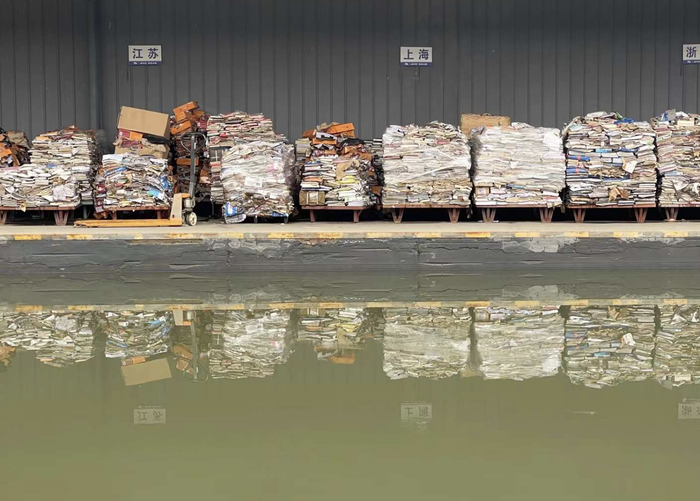Before the flood, Zhuozhou was home to over a hundred publishers. Their books are now heaps of decaying sludge. Losses will exceed 10 billion yuan.

Photo from CFP
By PAN Wenjie
It has been ten days since the Zhuozhou flood that made global headlines overwhelmed a warehouse belonging to the publishing house Taiyuanbowen Culture. The site is still surrounded by water, mud and garbage.
Since the water flooded in, manager JIU Yue has been struggling to get it back out again. More or less stranded there, she says no help has come along.
Taiyuanbowen – specializing in culture, not hydrology - bought two pumps to drain the water, but it didn’t help at all. Two more, and still the water did not recede.
“We need some professional help here to get the water out,” said Jiu. “We can’t even go inside the warehouse.”
But it's not just the stock that's waterlogged. Taiyuanbowen’s offices, dormitories and cafeteria are all under water. Dead cattle washed up outside the building Jiu once called home.
“The smell is horrible,” she said. “Even when the water is gone, I’m afraid we can’t go back to the offices or apartments.”

At another publisher, Jiwentianxia, the situation is slightly better, water is almost gone and they are free to enter a vast cavern of malodorous mud. YANG Yibo and his colleagues wore masks and shoveled the mud out themselves. Storage racks are rotting, and the books that were not submerged are now damp, swollen and festering. They can’t be sold to anyone.
Huyang Culture’s editor Yangzi and her team got into the warehouse on August 7 and have spent their time since rescuing what they can. As a large number of books were sorted out, the water that had been absorbed by the pages began to seep out again.
Yangzi wrote on her WeChat Moments, “Books soaked by water are truly toxic. The smell is unbearable, even my eyes sting."
After two or three days had only sorted out 60 percent of the inventory, and she was exhausted.

Zhuozhou is a small county-level town in Hebei Province, the heart of industrial China. When the flood came on July 31, more than a sixth of the city's inhabitants had to evacuate.
The small town's identity is not defined as many of its neighbors by steel mills and factories. Zhuozhou is home to over a hundred publishers and warehouses where books are held before shipping. The books are mostly now muddy muck. Losses will exceed 10 billion yuan.
Every publisher Jiemian News talked to spoke of running into trouble with sales platforms and delivery companies.
"E-commerce has very strict requirements. If we don't ship within 24 hours, the backend system will issue warnings. We've already received several hundred warnings," said Yangzi.
As if that wasn't bad enough, Jiu Yue noticed bargain book offers under the guise of the Zhuozhou Book Warehouses, conducting a "last 24-hour clearance sale."
She worries that unscrupulous companies are selling books in the name of Zhuozhou and lining their own pockets at the expense of publishers who truly need help.
Taobao and Pinduoduo have campaigns to help Zhuozhou publishers. Many publishers are selling “support packages” - a bundle of random books at a fixed price, but they won’t be delivered any time soon, more like October. Book China, one of the earliest online sales platforms has sold 10,000 such packages.
Yangzi said names like Book China might get more attention from the public, but empathy can’t save everybody. Publisher Hantang Sunshine has lost about 10 million yuan. Yangzi’s company Huyang Culture lost about four million yuan, half a year of hard work.
Jiu Yue said among hundreds of publishers affected by the flood, no more than five are receiving substantial help. Her company Taiyuanbowen has also made support packages, but it does not operate e-commerce shops, so the only channel to sell them is through the staff’s personal social media.
“We mostly sell school books to schools and have zero experience in e-commerce,” Jiu Yue said. “No one is buying our books.” And that is the reality for most publishers in Zhuozhou.
Jiu has reached out to the media for help, not with selling books, but with storing them.
“If some supplier out there is willing to give us a discount on new bookshelves and other equipment, I’d be really grateful,” she said.
Most of those washed out have no insurance. Jiu hopes the government will offer some solution.
A regional head from a medium-sized property insurance company told Jiemian News that insurance companies do not offer standalone coverage for books due to the "high risks of flooding and fire."
They have provided insurance for large bookstores, but it required bundling books with other assets such as buildings and vehicles. Despite the bundling, coverage was only provided reluctantly.
Books and paper products have relatively high risks, and a single incident can lead to complete loss. Insurance companies have corresponding risk rates. If the rate is high, book companies can't afford it; if it's too low, it disrupts the market order and goes against logic.
An insurance broker said that there was a client with storage facilities in Zhuozhou who inquired about coverage just last month. However, the negotiation fell through due to pricing issues.
"Their warehouse conditions didn't meet our underwriting requirements, which led to relatively high coverage conditions. The client felt it was too expensive."